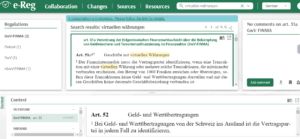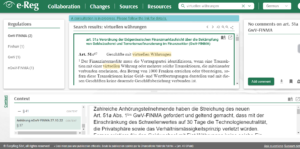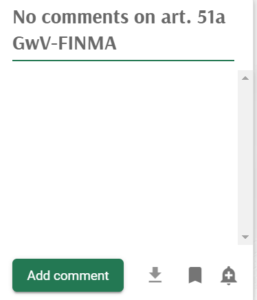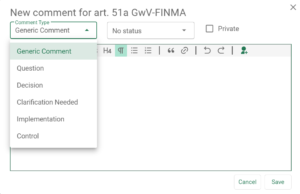Simplifying financial regulation : our practical proposals

Bank employees, consulting firms and lawyers know that financial regulations are becoming increasingly complex after each reform or crisis in the financial markets. So how to simplify banking regulations implementation to limit risk and ensure compliance? We explain the difficulties faced by these professionals, and the comfort provided by a RegTech solution, based on concrete examples.
1 – Banking regulation is becoming more complex
Successive financial market crises, particularly that of 2008, have led to tighter banking regulation at every turn. Recent events, such as the collapse of SVB in the USA and the takeover of CS by UBS, have prompted regulators to modify existing financial regulations and add new ones. The number of constraints and regulatory ratios is increasing. The calculation of each ratio particularly for reporting purposes is becoming more complex.
1.1 – Overlapping regulatory texts in Switzerland and abroad
Banks are faced with the challenge of Swiss regulations, which have become increasingly dense over the years. Let’s not forget the international standards and regulations issued by the Basel Committee, such as Basel III Final, the FSB, the FATF and the European Commission. They have a direct or indirect impact on the Swiss banking sector. In such cases, employees of financial institutions must implement these international regulatory requirements, where applicable. However, they need to be aware of those rules or have access to them.
1.2 – Balancing regulatory excesses and shortcomings
The Swiss Financial Market Supervisory Authority (FINMA) aims to simplify financial regulation for small banks, going beyond the principle of proportionality. It is thus working to identify and then remove certain prudential requirements for small, financially solid banking organizations. The International Monetary Fund (IMF) refers to the difficult balance between excessive and insufficient regulation in a March 2017 communication. It points out that international financial cooperation remains essential, and that a safer financial system through regulation remains largely advantageous. It explains too that it’s necessary to “preserve the fundamental principles of the new global regulatory framework”.
Recent events in the banking area in both Switzerland and the US confirm this certainty. Financial regulation is not going to simplify in the short to medium term. Particularly, the notion of proportionality in regulation could decrease. For example, SVB has used its small size and lack of complexity as an argument to reduce applicable banking regulation.
1.3 – A lack of simplicity in managing regulatory changes
Financial regulations change frequently. The sources of information to be exploited and the standards with which banks must comply are multiple. What’s more, their implementation timetables are sometimes different. Deploying these standards and banking regulations requires energy and organization, in addition to the traditional activities of these financial services. Both bank employees and consultancy firms suffer from a lack of practical tools for a proper management of financial regulation.
1.4 – A difficult regulatory overview
With so many regulatory sources in Switzerland, the Basel Committee and various international organizations, including institutions in Europe, the overall picture seems complicated. Within the same bank, several departments are responsible for driving regulatory changes. This task requires coordination and consultation. Without an ad hoc system to support these financial teams, managing a regulatory change stays complex. Sometimes, the results are not sufficient to achieve compliance and regulatory requirements.
1.5 – A costly and insufficiently productive compliance
This complex financial regulation generates generally wasted time, loss of productivity and additional costs. This is true not only for bank employees in the legal, finance, risks and compliance departments, but also for the consulting firms that support them. Research and analyses take time.
In addition, these professionals are sometimes faced with the difficulty of interpreting a regulation due to the lack of context surrounding the text. This increases the time spent on compliance items, unless you have a RegTech application that facilitates access to banking regulation.
2 – What tools should be used to simplify banking regulation in Switzerland ?
The stakes of simplifying the implementation of regulations therefore seem really high. All information is being dematerialized worldwide. RegTech players have developed services to facilitate this work for finance professionals. easyReg, for example, offers a totally digital solution to help the Swiss banking sector search regulation information. The tool also enables collaborative management of regulatory changes.
2.1 – RegTech simplifies your regulatory research
For banks, lawyers and consultancies, RegTech is an ideal way to simplify their research in financial regulation.
2.1.1 – The targets of our RegTech application for your regulatory framework management
easyReg offers you an online platform in SaaS mode that :
- digitizes all your regulatory research work ;
- increases compliance as required by the texts, acts, ordinances, FINMA circulars, etc. you must apply ;
- helps you improve your knowledge of banking regulations ;
- reduces the total time spent on financial compliance and subsequently its cost.
2.1.2 – How e-Reg regulatory search tool operates
With our keyword search features, you access the regulatory paragraph you’re looking for, and its full context. It takes only a few clicks. We also provide you with all the other regulatory elements that relate to your search. Federal act, ordinances, FINMA circulars or explanatory reports, you have access to all related information. We can also provide you with your colleagues’ comments on these texts.
2.1.3 – Example of a regulatory search with e-Reg, our RegTech tool
Here’s an example using the keyword “virtuellen währungen”. Please note that we offer our RegTech services in 4 languages : English, French, German and Italian. Enter “virtual currency” in the e-Reg search engine.
You’ll get the following information :

The window at bottom left provides you with all the regulatory context for this search result. Move your mouse over the document sources and click on the one that interests you. It is displayed in the bottom right-hand window.
In the main window at the top of the screen, scroll through the text using the right-hand scroll bar. You will discover clickable links such as “art. 51a Verordnung der Eidgenössischen Finanzmarktaufsicht über die Bekämpfung von Geldwäscherei und Terrorismusfinanzierung im Finanzsektor (GwV-FINMA)”. Click on this link. You can then choose, for example, to display it in a new window. You can also read the context too, at the bottom of the screen :

2.2 – e-Reg, a collaborative tool for regulation professionals
Our Regulatory Technology solution also brings comfort to employees and their officers who are managing regulatory change projects. This is a good manner to simplify the financial regulation in Switzerland.
2.2.1 – Features for collaboration between finance teams
Thanks to e-Reg, bank employees, lawyers and consulting firms have access to an easy-to-use collaborative tool. It guides them in their regulatory research. It helps them exchange information with each other. It’s an excellent way of sharing knowledge within the company. e-Reg also keeps track of the methods used to implement financial regulations. Users of our RegTech solution also find it a useful tool for training junior staff, as well as for managing backups, e.g. for vacations.
Here are the collaborative features of our RegTech tool :
- input of comments on regulations or on regulatory changes to be made within the company ;
- possibility of tagging a colleague when writing a comment in order to inform them by email;
- dashboard listing all current comments created within the team ;
- assigning a manager to the changes required and monitoring progress through status management.
2.2.2 – Example of knowledge sharing proposed by e-Reg
Let’s continue our example of a regulatory search on the keyword “virtuellen währungen”. If you wish to leave a comment, use the window on the right of the screen :

Click on “add a comment”. The following window will open with a proposal list :

You can choose a comment type and a status. To tag a colleague in the bank or a colleague in your consultancy, use the @ function in the text field. The list of RegTech solution users appears :

To view all comments and statuses, go to the “Collaboration” tab in the RegTech software. You’ll find a variety of criteria to filter the information. They help you manage your banking regulation projects.
To ease the regulatory burden of your staff, there’s nothing better than a RegTech tool like e-Reg. Designed by and for bank compliance actors, it’s the ideal application if you want to simplify banking regulation. To find out more, contact easyReg.